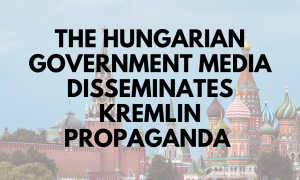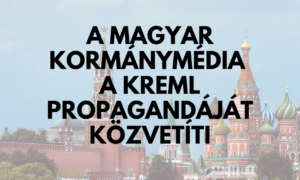
Putin, the man who wasn’t even there
In the following, we will summarise how the popular Krónika news show, which airs at noon every day on the...
As part of our broader analysis of how the election campaign is covered in the television news, it seemed evident that we should examine how the Hungarian news shows we tracked have informed the public on the issue since the launch of the Russian attack on Ukraine. In our research we collected and analysed those news items in which Hungarian politicians were asked to comment if the segment in question was also relevant to the campaign in some way, be it directly or indirectly.

In the period before the attack, Ukraine was given comparatively little space among the foreign news items with some relevance to Hungary. Although the news shows did touch on Hungary’s relations with Russia, as well as the relations between NATO and the EU on the one hand and Russia on the other, even the news items in question devoted relatively little attention to Ukraine. In the period before the war, foreign news with relevance to Hungary made up a small proportion of all news anyway, but after the invasion began both the number of items and the time dedicated to them increased massively.
Figure 1 The proportion of foreign policy news items as a share of all coded news items on the channels we tracked during the periods from 12 to 22 February and 23 to 25 February
Figure 2 The time devoted to foreign policy news (in minutes) and its share on the channels we tracked during the periods from 12 to 22 February and 23 to 25 February
Since the start of the invasion this issue – understandably – has made up a substantial proportion of the news shows overall news coverage. This also implies that both tabloid news and domestic news have been relegated somewhat to the background. In the case of the commercial channels – where tabloid news tend to be dominant –, the result was that the events in Ukraine emerged as the leading news, while the tabloid items only start somewhere halfway through the news shows.
Nevertheless, the actual coverage and editorial practices of the channels we analysed differ. Some report about the news in larger blocks, while others devote several distinct short items to the issue.
Figure 3 The daily average time devoted (in minutes) to foreign news items that have some relevance for Hungary on the channels we tracked
Given its objective, a study focusing on the media coverage of the parliamentary election is less ideal for exploring and shining a light on the deeper layers of foreign policy coverage and the professionalism of the latter. Nevertheless, what does emerge clearly from our survey is how this issue is used by the television channels in the context of their approach to the election.
All of the channels present the government’s activities in some detail. These accounts present the events and the activities of politicians in a manner that appears objective (for reasons of space we cannot go into a discussion of their comprehensiveness or their actual adherence to factuality). After the presentation of the opinions and the measures taken, it was also not unusual for politicians to emphatically reflect on the domestic relevance of the news they had commented on. The potential military threats, the preparedness of the Hungarian army, as well as the large number of refugees expected were expounded on in detail. The earlier pre-war narrative, which posited that the main objective of Hungarian foreign policy was to attain peace, continued to feature heavily, but the coverage after the start of the invasion focused more intensely and presented more clearly the close cooperation with the allies, while the distinct Hungarian measures moved into the background.
We examined the contents of the news using a simplified framework and found that while in the news shows before the war – but already during the campaign period – the proportion of news that objectively presented the government’s activities and the relevant events without an evaluative comment were relatively rare, the share of news that lauded the government’s activities in turn were relatively high. Since the start of the war, the proportions have shifted massively in favour of the former. Thus, for example, in the case of TV2 the share of news that praised the government dropped from 31% to only 3%, while the share of news that placed objective coverage front and centre increased from 17% to 34%. (In the case of Duna TV, the share of laudatory news fell from 22% to 14%, while items featuring objective coverage surged from 17% to 46%). At the same time, it is important to stress that such a change was not discernible with respect to the way the opposition was portrayed in the news. Specifically, the share of items that were critical of the opposition was largely unchanged in the case of Duna TV (a slight decline from 35% to 29%), while in the case of TV2 the share of items that presented the opposition’s activities in a critical light actually increased (from 35% to 52%).
The shift in the substance and the editorial policy towards war-related news is also apparent in the fact that while in general the journalistic practices of TV2 and Duna TV were characterised by a one-sided presentation of the news (56% of news on TV2 and 42% of news on Duna were classified as such by us), in the context of the news on Ukraine the coverage was so different from what we observed prior to the war that with respect to the reports on the war, the category of biased coverage was almost completely crowded out by the category we coded as irrelevant to the election
Figure 4 The share of news items characterised by a one-sided vs. a balanced coverage in the news items concerning Ukraine
Nevertheless, the effort to link the Ukraine-related news to the elections in Hungary was manifest in the coverage of the war. The prime minister, the foreign minister, and some politicians without a major role in managing Hungary’s reaction to the war situation continued to focus heavily on the idea that the Hungarian government’s domestic and economic successes were not at risk thus far because of the war. They argued that the government was capable of preventing a situation in which “Hungary’s successes” could be compromised by either immediate threats or by indirect problems stemming from the sanctions imposed on Russia. Reports that leaned towards the government emphasised that the latter would not yield to efforts that could jeopardise the government’s successes and achievements thus far, sometimes explicitly naming these threats, sometimes only referring to them in a generalised manner.
One of the most striking and decisive elements of the continued efforts to tie the war coverage to the election was that the news shows continued to devote substantial space to discrediting the opposition, and especially the opposition’s PM candidate, Péter Márki-Zay, in the context of their coverage of the war, too. Comments by government party figures laid the ground for the three-minute news blocks devoted by TV2 in the first two days of the war to the opposition candidate for prime minister (they were entitled The left would send soldiers into Ukraine and Márki-Zay would put Hungarians at risk). Duna TV also focused on Márki-Zay during all three days we analysed after the start of the war, devoting distinct blocks to the issue (Márki would send soldiers and arms, Dangerous statements by the left and Márki-Zay would also supply weapons [to Ukraine]), featuring highlighted pull quotes by Márki-Zay out of their context, which were left on the screen for a comparatively long time. This sought to underline the idea that if given the chance, the politician and the left would put Hungarians in danger. The compilations also added that the measures that the left would take would hurt Hungary’s achievements thus far, putting an end to the utility cost freeze imposed by Fidesz, jeopardising Hungary’s energy supply and the welfare of the Hungarian public. At the same time, RTL’s coverage on the subject noted already in its title (Debate about the Hungarian position) that the context of the domestic political competition has an impact on the respective opinions about the Ukrainian conflict, and the news items in question focused on presenting the different views rather than taking sides.
Bankszámlaszám: 12011265-01425189-00100001
Bank neve: Raiffeisen Bank
Számlatulajdonos: Átlátszónet Alapítvány
1084 Budapest, Déri Miksa utca 10.
IBAN (EUR): HU36120112650142518900400002
IBAN (USD): HU36120112650142518900500009
SWIFT: UBRTHUHB
Számlatulajdonos: Átlátszónet Alapítvány
1084 Budapest, Déri Miksa utca 10.
Bank neve és címe: Raiffeisen Bank
(H-1133 Budapest, Váci út 116-118.)
Támogasd a munkánkat az Átlátszónet Alapítványnak küldött PayPal adománnyal! Köszönjük.
Havi 5400 Ft Havi 3600 Ft Havi 1800 Ft Egyszeri PayPal támogatásHa az 1 százalékodat az Átlátszó céljaira, projektjeire kívánod felajánlani, a személyi jövedelemadó bevallásodban az Átlátszónet Alapítvány adószámát tüntesd fel: 18516641-1-42
1% TÁMOGATÁS

In the following, we will summarise how the popular Krónika news show, which airs at noon every day on the...

Az alábbiakban összefoglaljuk, hogy a sokak által hallgatott, a Kossuth Rádióban minden délben jelentkező Krónika c. hírműsor hogy számol be...

The attack on Ukraine has led to a widespread outrage in Hungary. However, the deep polarisation that divides Hungarian society...

Ukrajna megtámadása széleskörű felháborodást váltott ki Magyarországon, de a társadalom polarizáltsága ebben a témában is jól láthatóvá vált. A legtöbben...
Támogasd a munkánkat banki átutalással. Az adományokat az Átlátszónet Alapítvány számlájára utalhatod. Az utalás közleményébe írd: „Adomány”, köszönjük!